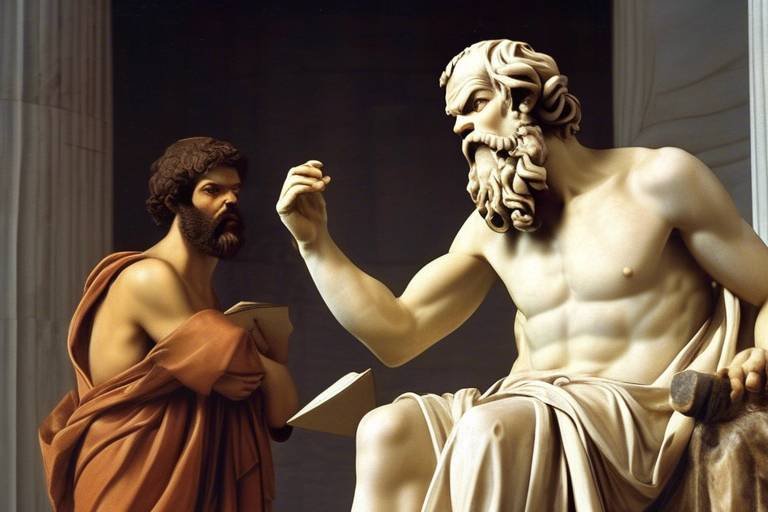Exploring the Philosophy of Albert Camus
Albert Camus, a towering figure in 20th-century philosophy, invites us to ponder the complexities of existence through his unique lens. His ideas challenge us to confront the absurdity of life, a theme that resonates deeply in today's fast-paced world. Camus' philosophy is not merely an academic exercise; it’s a call to action, urging individuals to seek meaning in a universe that often seems indifferent to our struggles and aspirations. As we delve into his key concepts—like existentialism and absurdism—we'll uncover how they relate to the human condition and continue to influence modern thought.
At the heart of Camus' work lies the notion that life is inherently devoid of meaning, yet it is our responsibility to create our own purpose. This paradox is beautifully articulated in his essays and novels, where he explores themes of rebellion, freedom, and the quest for authenticity. Camus doesn't just present a bleak outlook; instead, he offers a roadmap for navigating the chaos of existence. Through his writings, he encourages us to embrace the absurd, find joy in the struggle, and live fully in the moment.
As we journey through the various facets of Camus' philosophy, we will examine how his ideas challenge societal norms and provoke critical thought. His works, such as The Myth of Sisyphus and The Stranger, serve as both philosophical treatises and poignant narratives that illustrate his profound insights. By understanding Camus' perspective, we can better appreciate the beauty and complexity of our own lives, even amidst uncertainty and despair.
In the sections that follow, we will dissect the essence of absurdism, explore the implications of living without appeal to divine justice, and appreciate the role of rebellion in finding personal meaning. We will also engage with Camus' relationship to existentialism, highlighting both the connections and distinctions that define his unique philosophical stance.
So, are you ready to embark on this intellectual adventure? Let's dive deeper into the philosophical ocean that is Albert Camus, and perhaps, like Sisyphus, we will find our own way to embrace the struggle and rise above the absurd.
- What is absurdism? Absurdism is a philosophy that explores the conflict between humans' desire for meaning and the indifferent universe.
- How does Camus differ from existentialists? While both address the human condition, Camus emphasizes the absurd and the necessity of creating meaning in a meaningless world, whereas existentialists often focus on individual freedom and choice.
- What is the significance of The Myth of Sisyphus? This essay illustrates the concept of absurdity and the idea that one can find meaning through rebellion against the absurd.
- Who is Meursault in The Stranger? Meursault is the protagonist whose emotional detachment and indifference raise questions about societal norms and morality, embodying Camus' themes of absurdity.

Understanding Absurdism
Absurdism, a central pillar of Albert Camus' philosophy, grapples with the inherent conflict between humanity’s relentless quest for meaning and the universe's indifferent silence. Imagine standing in a vast, empty room where every question you ask echoes back without an answer. This is the essence of absurdism—a confrontation with the absurdity of life. Camus believed that this realization could be both liberating and daunting. It encourages us to embrace the chaos of existence rather than succumb to despair.
At its core, absurdism posits that life is devoid of inherent meaning, yet humans are wired to seek it. This paradox creates a tension that can be both unsettling and invigorating. When we acknowledge the absurd, we confront the reality that our lives may not have the grand purpose we desire. Instead of wallowing in this realization, Camus suggests we can find freedom in it. It’s akin to being given the keys to a locked room; once you accept that the room is empty, you can finally explore it without the weight of expectation.
To further understand absurdism, let’s break down its key tenets:
- The Search for Meaning: Humans are naturally inclined to seek purpose and significance in their lives.
- The Indifference of the Universe: The universe does not provide answers or meaning, remaining indifferent to our struggles.
- Rebellion: Recognizing the absurdity of life invites a rebellion against it, where individuals create their own meaning.
In our daily lives, absurdism can manifest in various ways. Consider the moments when you feel overwhelmed by the chaos of existence—perhaps during a global crisis or personal turmoil. It’s easy to feel lost, as if the universe has turned a blind eye to your plight. Yet, Camus encourages us to embrace these feelings, to understand that they are part of the human experience. By doing so, we can cultivate a sense of resilience and find joy in the fleeting moments of life.
Moreover, absurdism invites us to engage with the world authentically. Instead of seeking validation from external sources or adhering to societal expectations, we are encouraged to define our own values and create meaning through our actions. This perspective fosters a profound sense of personal responsibility. It’s not about waiting for a divine intervention or cosmic sign; it’s about recognizing that we have the power to shape our own destinies, even in a world that seems indifferent.
Ultimately, understanding absurdism is about embracing the contradictions of life. It’s about recognizing that while the universe may not offer answers, we can still find beauty and purpose in our existence. By confronting the absurd, we can live more authentically, appreciating the transient moments that make life worth living. So, the next time you feel the weight of existence pressing down on you, remember Camus' philosophy: it’s not about finding the meaning, but rather creating it in a world that offers none.

The Myth of Sisyphus
In his groundbreaking essay, , Albert Camus presents a profound exploration of the absurd condition of human existence. At its core, the essay draws on the ancient Greek myth of Sisyphus, a figure condemned by the gods to eternally roll a boulder up a hill, only to watch it roll back down each time he reaches the summit. This relentless cycle serves as a powerful metaphor for the human struggle against the inherent meaninglessness of life. Camus challenges us to confront the absurdity of our existence, suggesting that while life may lack ultimate purpose, it is our response to this realization that defines us.
Camus argues that the recognition of life's absurdity leads us to a pivotal moment of choice. Rather than succumbing to despair, we can choose to embrace our situation and find personal meaning within it. This is where the concept of rebellion comes into play. By acknowledging the absurd, we become free to create our own values and purpose. In this sense, Sisyphus becomes a symbol of resilience and defiance. As Camus famously concludes, “One must imagine Sisyphus happy.” This statement encapsulates the idea that true happiness can be found in the struggle itself, rather than in the attainment of a goal.
To delve deeper into the implications of Camus' philosophy, we can highlight several key themes:
- Acceptance of Absurdity: Embracing the absurd condition of life allows individuals to confront their reality without illusions.
- Personal Rebellion: Recognizing the lack of inherent meaning empowers individuals to forge their own paths and values.
- Freedom and Responsibility: With the absence of predetermined purpose comes the freedom to make choices, accompanied by the responsibility for those choices.
Camus’ exploration of Sisyphus also raises important questions about the nature of existence. Are we, like Sisyphus, condemned to a life of futile labor? Or can we find joy in the struggle itself? This philosophical inquiry invites readers to reflect on their own lives and the meaning they derive from their experiences. It encourages a shift in perspective, urging us to find beauty in the mundane and to celebrate the act of living, regardless of the outcomes.
In essence, serves as a rallying cry for those grappling with the absurdity of life. It invites us to reconsider our relationship with existence, urging us to confront the void with courage and creativity. By doing so, we can transform our struggles into a source of strength and purpose, much like Sisyphus, who, despite his eternal punishment, continues to push his boulder up the hill with unwavering determination.
- What is the main idea of The Myth of Sisyphus?
The essay explores the conflict between human desire for meaning and the indifferent universe, using Sisyphus as a symbol of resilience in the face of absurdity. - How does Camus define absurdity?
Absurdity arises from the clash between our search for meaning and the universe's silence, leading to a recognition of life's inherent lack of purpose. - What does Camus mean by "One must imagine Sisyphus happy"?
It suggests that true happiness comes from embracing the struggle and finding meaning in the journey, rather than in the destination.

Rebellion Against the Absurd
When we talk about , we’re diving into one of the most powerful ideas that Albert Camus presents in his philosophy. Imagine standing on the edge of a cliff, staring into an endless abyss. It’s daunting, right? But Camus suggests that instead of succumbing to despair, we can choose to embrace the absurdity of life. This rebellion isn’t about fighting against the universe; rather, it’s about acknowledging its indifference and choosing to live fully in spite of it.
At the heart of this rebellion lies the idea that recognizing the absurd can actually empower us. It’s like waking up from a dream and realizing that the world doesn’t owe us anything. In this acceptance, we find a kind of freedom. We can create our own meaning and purpose, even when the universe seems to offer none. Camus argues that once we confront the absurd, we can live authentically. This authenticity is a form of rebellion against the societal norms that often dictate our lives.
How do we embrace this rebellion in our daily lives? Here are a few ideas:
- Live in the Moment: Focus on the present and engage with the world around you. Life is fleeting, and by appreciating each moment, you assert your existence against the absurd.
- Challenge Norms: Don’t just accept societal expectations. Question them. Why do we conform? Embracing absurdity means forging your own path.
- Find Joy in the Struggle: Like Sisyphus pushing his boulder, the struggle itself can be fulfilling. Embrace the challenges as part of your journey.
Camus believed that this rebellion is not a one-time act but a continuous process. Each day presents new absurdities, and with each new challenge, we have the opportunity to reaffirm our commitment to living authentically. This rebellion against the absurd is a declaration of our existence. It’s a way of saying, “I am here, I matter, and I will create my own meaning in this indifferent universe.”
In essence, Camus invites us to be like Sisyphus, who, despite his eternal punishment, finds joy in the act of pushing the boulder up the hill. It’s a powerful metaphor for our own lives. By recognizing the absurd and choosing to rebel against it, we can transform our experiences into something meaningful. This is the essence of Camus’ philosophy—a call to embrace life in all its absurdity and to find our own path through the chaos.
- What is the main idea behind Camus' concept of absurdism?
Absurdism centers on the conflict between the human desire for meaning and the indifferent universe. It suggests that while life may seem meaningless, we have the power to create our own meaning. - How does rebellion against the absurd relate to personal freedom?
By recognizing the absurdity of life, individuals can break free from societal expectations and live authentically, making choices that reflect their true selves. - Can you explain the significance of Sisyphus in Camus' philosophy?
Sisyphus symbolizes the human struggle against the absurd. His eternal task of pushing a boulder up a hill represents the idea that we can find joy and meaning in the struggle itself, despite its futility.

The Role of Freedom
In the realm of Albert Camus' philosophy, the concept of freedom is not merely a political or social construct; it is deeply intertwined with the recognition of absurdity. For Camus, once we acknowledge the inherent absurdity of life—the clash between our quest for meaning and the universe's indifference—we unlock a profound sense of freedom. This freedom is not about the absence of constraints but rather about the embrace of responsibility that comes with acknowledging our own existence.
Imagine standing at the edge of a vast, open field. You can run in any direction, but the ground beneath your feet is uneven, and the sky above is unpredictable. This image encapsulates Camus' view of freedom. It is exhilarating yet daunting. The realization that life is absurd liberates us from the shackles of imposed meanings and societal expectations. Instead of seeking validation from external sources, we begin to define our own paths. This journey towards self-definition is what Camus considers true freedom.
Moreover, embracing absurdity fosters a sense of liberation in our choices and actions. When we understand that there is no ultimate meaning to life, we become the architects of our own existence. We are free to create our own values and live authentically. This is where the responsibility of freedom comes into play. With the power to choose comes the weight of those choices. Camus argues that we must confront the consequences of our actions, making us not only free but also accountable.
In practical terms, this freedom manifests in several ways:
- Authenticity: Living in accordance with our true selves rather than conforming to societal norms.
- Choice: Embracing the ability to make decisions that reflect our personal beliefs and values.
- Engagement: Actively participating in life, fully aware that our actions have significance in an otherwise indifferent universe.
Camus emphasizes that this freedom is not a one-time revelation but a continuous process of self-discovery and engagement. Each moment becomes an opportunity to assert our freedom, to rebel against the absurd, and to create meaning in a world that offers none. In this light, freedom is not just a theoretical concept; it is a lived experience, a daily practice of asserting our existence and making choices that resonate with our understanding of the absurd.
In conclusion, the role of freedom in Camus' philosophy is a dynamic interplay between recognition of absurdity and the responsibility that follows. It invites us to live with intention, to confront our choices head-on, and to carve out our own meanings in a universe that often seems devoid of them. By embracing this freedom, we not only honor our individuality but also enrich our human experience.

Living Without Appeal
Albert Camus provocatively argues for a life lived without the hope of an afterlife or the expectation of divine justice. This concept, often referred to as "living without appeal," challenges the traditional notions of morality and purpose that many people cling to. Imagine standing on the edge of a vast, empty canyon, where the echoes of your past beliefs fade away, leaving you with nothing but the stark reality of existence. In this space, you are forced to confront the rawness of life and the choices you make without the comforting blanket of religious or metaphysical assurances.
Living without appeal means embracing the idea that life is inherently devoid of ultimate meaning. Instead of seeking solace in the promise of an afterlife or the belief in a higher power that governs our actions, Camus encourages us to find fulfillment in the here and now. This perspective can be both terrifying and liberating. It allows individuals to take full responsibility for their actions and decisions, as they are not bound by a predetermined fate or divine judgment. This sense of freedom can lead to a more authentic existence, where one engages deeply with the present moment and the world around them.
Consider the implications of this philosophy in daily life. When you stop waiting for external validation or hope for a reward in the afterlife, you begin to appreciate the beauty of existence itself. Here are some key takeaways from Camus' idea of living without appeal:
- Authenticity: By rejecting external appeals, individuals can pursue their true selves and make choices that resonate with their core values.
- Engagement: This approach encourages active participation in life, fostering deeper connections with others and the world.
- Responsibility: Without the safety net of divine judgment, individuals become accountable for their actions, leading to more thoughtful decision-making.
In essence, living without appeal is about embracing the absurdity of life and finding joy in the act of living itself. It’s about crafting your own meaning in a world that offers none. By acknowledging that we are responsible for our own happiness, we can start to live more fully, appreciating each moment as it comes. Camus doesn’t suggest that this is an easy path; rather, it’s a courageous choice to face the chaos of existence head-on. In doing so, we can discover a profound sense of freedom and empowerment that comes from understanding our place in an indifferent universe.
- What does Camus mean by "living without appeal"? Camus refers to the idea of living without relying on the hope of an afterlife or divine justice, focusing instead on the present moment and personal responsibility.
- How can living without appeal impact my daily life? It encourages authenticity, deeper engagement with life, and a greater sense of responsibility for your choices.
- Is living without appeal a common philosophy? While not mainstream, it resonates with existentialist and absurdist thinkers who emphasize personal meaning in an indifferent universe.

Camus and Existentialism
When we think about existentialism, names like Jean-Paul Sartre and Simone de Beauvoir often come to mind. However, Albert Camus, while frequently associated with this philosophical movement, carved out his own distinct path. He didn't want to be pigeonholed as just another existentialist; instead, he sought to highlight the nuances that set his philosophy apart. At the heart of this distinction is the concept of the absurd.
Existentialism posits that life is inherently meaningless, and it's up to individuals to create their own meaning. Camus, on the other hand, embraced the idea that the universe is indifferent to our existence. He argued that while we may search for meaning, we often confront a reality that is devoid of it. This realization can be jarring, but it also opens the door to a new way of living. Rather than succumbing to despair, Camus suggests we can find freedom in the absurdity of our existence.
One of the key differences between Camus and traditional existentialists is his rejection of the notion that life must have an ultimate purpose. While existentialists might argue that we have the responsibility to forge our own meaning, Camus believed that the search for meaning itself is an absurd endeavor. He famously stated, "The struggle itself toward the heights is enough to fill a man's heart. One must imagine Sisyphus happy." This quote encapsulates his belief that the journey, rather than the destination, is where we can find joy and fulfillment.
To illustrate this further, let's consider the following table that outlines some key differences between Camus' philosophy and traditional existentialism:
| Aspect | Camus' Philosophy | Traditional Existentialism |
|---|---|---|
| View of Meaning | Life is inherently meaningless; search for meaning is absurd. | Life is meaningless, but individuals can create their own meaning. |
| Response to Absurdity | Embrace the absurd and find joy in the struggle. | Reject absurdity and assert personal freedom to create meaning. |
| Role of Freedom | Freedom comes from recognizing the absurdity of existence. | Freedom is a responsibility to define one's own existence. |
In essence, while Camus acknowledges the existential crisis—feeling lost in a world that doesn't care—he offers a refreshing perspective. Instead of viewing this crisis as a burden, he encourages us to embrace it. By confronting the absurd, we can cultivate a sense of freedom that allows us to live authentically. This is where the beauty of Camus' philosophy shines; it invites us to engage fully with life, despite its inherent chaos and unpredictability.
So, the next time you ponder the meaning of life or find yourself grappling with existential questions, consider Camus' approach. Instead of seeking definitive answers, perhaps it's more liberating to simply accept the absurd and make the most of our fleeting existence. After all, as Camus would argue, in a world without inherent meaning, the act of living itself can become our greatest rebellion.
- What is the main idea of Camus' philosophy? Camus' philosophy revolves around the concept of absurdism, which highlights the conflict between human beings' search for meaning and the indifferent universe.
- How does Camus differ from existentialists like Sartre? While both explore themes of meaning and existence, Camus emphasizes the absurdity of life, whereas existentialists focus on the individual's ability to create meaning.
- What does Camus mean by "the struggle itself is enough"? This phrase suggests that the journey of grappling with life's challenges can bring fulfillment, even in the absence of ultimate meaning.

The Stranger: A Philosophical Novel
Albert Camus' novel, The Stranger, is not just a story; it’s a profound exploration of existential themes that resonate deeply with the human experience. The protagonist, Meursault, embodies the essence of absurdism through his indifferent attitude towards life and death. From the very first lines, where he casually mentions his mother's death, we are thrust into a world where traditional emotional responses are turned on their head. This narrative invites readers to confront uncomfortable truths about existence and the societal norms that dictate our behavior.
Meursault's journey is a vivid illustration of how absurdism manifests in everyday life. His actions—or lack thereof—raise questions about the meaning of life and the arbitrary nature of societal expectations. For instance, during the trial that follows the murder he commits, the focus shifts from the crime itself to his character and emotional responses. The court's obsession with Meursault's indifference rather than the act of murder itself highlights the absurdity of human judgment and morality. In a world that often seeks to impose meaning, Camus challenges us to reconsider what it means to live authentically.
Throughout the novel, Camus employs a minimalist writing style that mirrors Meursault's detached perspective. The starkness of the prose serves to amplify the themes of absurdism. Readers are left to grapple with the uncomfortable realization that life may not have inherent meaning. It’s as if Camus is asking us: What do you really value? In a universe that seems indifferent to our existence, how do we navigate our lives? This exploration is both liberating and terrifying, as it forces us to confront the void and our place within it.
Moreover, the setting of The Stranger plays a crucial role in shaping its philosophical underpinnings. The sun, a recurring motif, often symbolizes both clarity and discomfort. For Meursault, the oppressive heat during pivotal moments of the story reflects his internal struggles and the absurdity of his situation. It’s a reminder that life is often a series of random events that we must navigate without the promise of meaning or justice. This relationship between environment and emotion is a powerful commentary on how external factors can influence our perceptions of reality.
In summary, The Stranger serves as a philosophical lens through which we can examine the absurdity of life. Meursault’s experiences challenge us to reflect on our own beliefs and the societal constructs that shape our understanding of morality and existence. Camus invites us to embrace the absurd, to find freedom in our choices, and to live authentically in a world that often feels chaotic and unpredictable. The novel is not just a story; it’s a call to recognize the beauty in our existence, despite its inherent lack of meaning.
- What is the main theme of The Stranger? The main theme revolves around absurdism, exploring the conflict between human desire for meaning and the indifferent universe.
- How does Meursault embody absurdism? Meursault's emotional detachment and indifference to societal norms illustrate the essence of absurdism, where life lacks inherent meaning.
- What role does the setting play in The Stranger? The setting, especially the sun, symbolizes clarity and discomfort, reflecting Meursault's internal struggles and the absurdity of his situation.
- Why is the trial significant in the novel? The trial highlights the absurdity of human judgment, focusing more on Meursault's character than the actual crime, questioning societal values and morality.

The Stranger
This article delves into the key concepts of Albert Camus' philosophy, examining existentialism, absurdism, and the human condition, while also highlighting his significant works and their impact on modern thought.
Absurdism, a cornerstone of Camus' philosophy, explores the conflict between human desire for meaning and the indifferent universe. This section breaks down key tenets and implications of absurdism in everyday life.
In this seminal essay, Camus uses the Greek myth of Sisyphus to illustrate his ideas of absurdity and rebellion. This section analyzes the symbolism and philosophical insights presented in the work.
Camus posits that recognizing the absurdity of life can lead to personal rebellion. This subsection discusses how embracing absurdism empowers individuals to find their own meaning and purpose.
Freedom is a vital aspect of Camus' philosophy. This section examines how acknowledging absurdity fosters a sense of liberation and responsibility in one's choices and actions.
Camus argues for living without the hope of an afterlife or divine justice. This subsection explores how such a perspective encourages authenticity and engagement in the present moment.
While often associated with existentialism, Camus distinguishes his views. This section clarifies the differences and overlaps between his philosophy and that of existentialist thinkers like Sartre.
Camus' novel serves as a narrative exploration of his philosophical ideas. The story revolves around the protagonist, Meursault, whose life is marked by a profound sense of detachment from the world around him. Through Meursault's experiences, Camus illustrates the themes of absurdity, the search for meaning, and the confrontation with societal norms. The stark realities of Meursault's existence challenge readers to reflect on their own lives and the inherent absurdity within them.
Meursault's emotional detachment raises questions about societal norms and morality. His indifference to events that would typically evoke strong emotional responses—such as his mother's death—serves as a powerful reflection of Camus' views on the absurdity of existence. In a world that often demands emotional engagement, Meursault's stoic demeanor forces us to confront uncomfortable truths about our own lives. Are we truly living authentically, or are we merely conforming to societal expectations? Through Meursault, Camus invites readers to explore the depths of their own indifference and the absurdity that underpins human experience.
The trial of Meursault serves as a critique of societal expectations and justice. Rather than focusing on the crime he committed, the court becomes fixated on Meursault's character and his emotional responses—or lack thereof. This absurdity of human judgment highlights the irrationality of societal norms and the often arbitrary nature of justice. Camus uses this event to comment on the absurdity of existence itself, suggesting that the search for meaning in a chaotic world may ultimately lead to disillusionment. In this way, becomes not just a story about one man's life, but a broader commentary on the human condition.
- What is the main theme of The Stranger? The main theme revolves around absurdism and the indifference of the universe, as illustrated through Meursault's experiences and actions.
- How does Camus define absurdism? Camus defines absurdism as the conflict between the human desire for meaning and the indifferent nature of the universe.
- What is the significance of Meursault's trial? Meursault's trial signifies the absurdity of societal judgment and the arbitrary nature of morality.
- Is Camus an existentialist? While often associated with existentialism, Camus distinguishes his philosophy by emphasizing absurdism over existentialist ideas of meaning and essence.

serves as a narrative exploration of his philosophical ideas. This section discusses the protagonist Meursault and how his experiences embody absurdist themes.
Albert Camus' novel The Stranger serves as a narrative exploration of his philosophical ideas, particularly the themes of absurdism and existentialism. At the heart of this compelling story is the protagonist, Meursault, whose life and experiences vividly illustrate the core tenets of Camus' philosophy. Meursault is not your typical hero; rather, he is a man whose emotional detachment and indifference to social norms challenge our understanding of morality and meaning in life.
Throughout the novel, Meursault's actions and reactions to the world around him reveal a profound sense of absurdity. For instance, when faced with the death of his mother, he exhibits a striking lack of grief, which raises eyebrows and questions from those around him. This emotional distance is not merely a character flaw; it represents Camus' idea that life is inherently meaningless, and thus, societal expectations are often arbitrary constructs. Meursault’s indifference serves as a mirror reflecting the absurdity of existence, prompting readers to confront their own beliefs about life and death.
Moreover, the novel's plot unfolds in a way that emphasizes the randomness of life. Meursault's decision to kill an Arab man on the beach is a pivotal moment that encapsulates the chaotic nature of existence. The act is not driven by hatred or premeditated intent but rather by a series of chance occurrences. This randomness is central to absurdism; it illustrates how life can be unpredictable and devoid of clear purpose. Meursault’s subsequent trial further highlights this theme, as the focus shifts from the crime itself to the societal norms and expectations surrounding his character. The absurdity of the judicial process, where the court is more concerned with Meursault's emotional responses than the actual act of murder, serves as a critique of the human tendency to impose meaning where there may be none.
In essence, Meursault embodies the struggle against the absurd. His journey invites readers to question the nature of existence and our place within it. By refusing to conform to societal expectations, he illustrates the possibility of living authentically in a world that often seems indifferent to individual suffering. This rebellion against the absurd is a key aspect of Camus' philosophy, suggesting that while life may lack inherent meaning, we have the power to create our own purpose through our choices and actions.
- What is the main theme of The Stranger? The main theme revolves around absurdism and the conflict between human desire for meaning and the indifferent universe.
- How does Meursault represent absurdism? Meursault represents absurdism through his emotional detachment and indifference to societal norms, highlighting the randomness of existence.
- What role does the trial play in the narrative? The trial serves as a critique of societal expectations and human judgment, emphasizing the absurdity of moral and legal constructs.

Meursault's Indifference
In Albert Camus' novel The Stranger, the protagonist Meursault epitomizes the essence of indifference, a central theme that resonates throughout the narrative. His emotional detachment and lack of response to societal expectations force readers to confront the absurdity of existence. From the very beginning, Meursault's reaction to his mother's death is strikingly unemotional; he reflects on the event with a sense of apathy that leaves many questioning the norms of grief and mourning. This sets the stage for a character who seems to navigate through life as if it were a series of random events rather than a meaningful journey.
Meursault's indifference can be viewed through several lenses, particularly in his interactions with others and his responses to pivotal moments. For instance, when faced with the death of his mother, he is more concerned about the physical discomfort of the funeral than the emotional weight of the loss. This indifference raises profound questions about the nature of human relationships and the societal expectations that dictate how one should feel and act in response to tragedy. Is it truly necessary to conform to these emotional scripts, or can one find freedom in the rejection of such norms?
Moreover, Meursault's indifference extends to his relationships, including his affair with Marie, which is marked by a lack of emotional depth. He enjoys her company but does not express any genuine affection or commitment. This behavior illustrates a key aspect of Camus' philosophy: the rejection of societal conventions in favor of personal authenticity. In a world that often demands conformity, Meursault's indifference serves as a radical act of rebellion against the expectations placed upon him.
The trial of Meursault further amplifies the implications of his indifference. Rather than being judged for the murder he commits, he is put on trial for his lack of emotion during his mother’s funeral. This absurd twist in the narrative highlights how society often prioritizes conformity over genuine human experience. The court's obsession with Meursault's emotional state rather than the act itself underscores the absurdity of human judgment and the arbitrary nature of societal norms.
Ultimately, Meursault's indifference is not merely a character flaw; it is a profound philosophical statement. It challenges readers to reflect on their own lives and the ways in which they engage with the world around them. Are we, like Meursault, simply going through the motions, or can we embrace the absurdity of existence to carve out our own paths? In a universe that offers no inherent meaning, Camus suggests that the true rebellion lies in living authentically, even if that means embracing a life devoid of traditional emotional responses.
- What is the significance of Meursault's indifference?
Meursault's indifference challenges societal norms and raises questions about emotional authenticity, highlighting the absurdity of existence. - How does Camus use Meursault's character to convey his philosophical ideas?
Through Meursault's actions and reactions, Camus illustrates the themes of absurdism and rebellion against societal expectations. - What role does the trial play in the narrative?
The trial serves as a critique of societal norms, emphasizing how judgment is often based on conformity rather than the actual events.

The Trial and Its Implications
In The Stranger, the trial of Meursault serves as a powerful critique of societal expectations and the often arbitrary nature of justice. Camus brilliantly uses this event to expose the absurdity that permeates human judgment. Imagine being judged not solely for your actions but for your failure to conform to societal norms. This is precisely what happens to Meursault, who finds himself on trial not just for the murder he commits but for his emotional detachment and indifference to social conventions.
During the trial, the prosecutor and defense attorney engage in a theatrical display that seems more focused on Meursault's character than the actual crime. The courtroom becomes a microcosm of society, where the quest for truth is overshadowed by the need for conformity and moral judgment. The prosecution paints Meursault as a monster, not merely because he killed a man but because he didn’t cry at his mother’s funeral. This raises a profound question: should our worth be determined by our emotional responses or by our actions? In this context, Camus invites readers to consider the absurdity of a justice system that prioritizes societal norms over individual circumstances.
As the trial unfolds, it becomes clear that the verdict is less about justice and more about the need to impose order on chaos. The jury's decision reflects a collective desire to uphold societal values rather than an objective assessment of Meursault's guilt. This highlights a critical aspect of Camus' philosophy: the struggle against the absurd. Just as Sisyphus pushes his boulder up the hill, Meursault faces the weight of societal expectations that threaten to crush him. The trial symbolizes the broader human condition, where individuals often grapple with the absurdity of existence and the relentless pursuit of meaning in a world that offers none.
Ultimately, the implications of Meursault's trial extend beyond the pages of the novel. They resonate with real-world issues, prompting us to reflect on how society judges individuals based on arbitrary standards. This theme of alienation and the absurdity of human existence invites readers to question the very foundations of morality and justice. In a world that often feels chaotic and indifferent, Camus encourages us to confront the absurd and to carve out our own meaning, even when faced with the harshest judgments of society.
- What is the main theme of Meursault's trial in The Stranger?
The trial highlights the absurdity of societal norms and the arbitrary nature of justice, focusing more on Meursault's character than on the actual crime. - How does Camus use the trial to illustrate his philosophy?
The trial serves as a microcosm of society, showcasing the conflict between individual authenticity and societal expectations, reflecting the absurdity of the human condition. - What does Meursault's indifference signify?
Meursault's emotional detachment symbolizes a rejection of societal norms and raises questions about morality and the nature of existence.
Frequently Asked Questions
- What is Absurdism according to Albert Camus?
Absurdism, as articulated by Albert Camus, is the philosophy that highlights the conflict between the human desire for meaning and the indifferent universe. It suggests that life is inherently devoid of purpose, yet we continue to seek it. This tension creates a sense of absurdity, prompting us to confront the reality of our existence.
- How does Camus use the Myth of Sisyphus to illustrate his philosophy?
In "The Myth of Sisyphus," Camus employs the story of Sisyphus, who is condemned to roll a boulder up a hill only for it to roll back down, as a metaphor for the human condition. This myth encapsulates the essence of absurdity and rebellion. Camus argues that, like Sisyphus, we must imagine him happy as he embraces his fate, finding meaning in the struggle itself rather than in any ultimate goal.
- What does Camus mean by rebellion against the absurd?
Camus posits that recognizing the absurdity of life can lead to a form of personal rebellion. This rebellion is not about defiance against the universe but rather an acceptance of our situation. By embracing absurdism, individuals can create their own meaning and purpose, liberating themselves from societal expectations and the search for intrinsic meaning.
- How does freedom play a role in Camus' philosophy?
Freedom is a crucial aspect of Camus' thought. By acknowledging the absurd, we gain a sense of liberation and responsibility in our choices. This freedom allows us to live authentically and engage with life fully, making conscious decisions without reliance on external validation or the hope of an afterlife.
- What is the significance of living without appeal?
Living without appeal, according to Camus, means rejecting the hope for divine justice or an afterlife. This perspective encourages individuals to focus on the present moment and engage with life authentically. It fosters a sense of responsibility and encourages us to create our own values and meanings rather than relying on external sources.
- How does Camus differentiate his views from existentialism?
While Camus is often associated with existentialism, he distinguishes his philosophy by emphasizing the absurd rather than the search for meaning. Unlike existentialists like Sartre, who focus on the individual's quest for purpose, Camus highlights the inherent meaninglessness of life and the importance of embracing that absurdity to find personal significance.
- What themes does "The Stranger" explore in relation to absurdism?
"The Stranger" serves as a narrative embodiment of Camus' philosophical ideas. The protagonist, Meursault, exemplifies emotional detachment and indifference, raising questions about societal norms and morality. His experiences reflect the absurdity of existence and challenge conventional views on justice and human behavior.
- How does Meursault's trial critique societal expectations?
The trial of Meursault in "The Stranger" serves as a critique of societal norms and the concept of justice. Camus uses this event to illustrate how human judgment can be absurd, often based on societal expectations rather than objective truth. This highlights the conflict between individual authenticity and societal pressures, reinforcing the themes of absurdity in the novel.



















